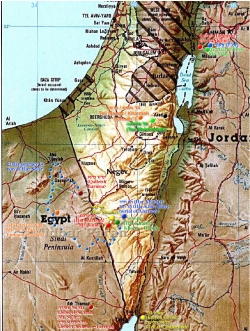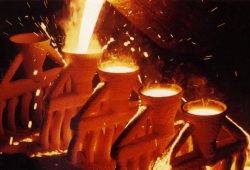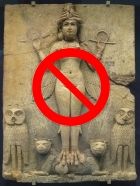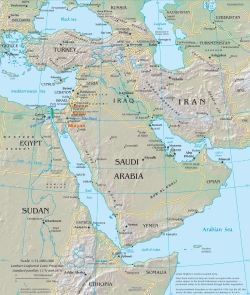
 |
| Torâh | Haphtârâh | Âmar Ribi Yᵊhoshua | Mᵊnorat ha-Maor |
|---|---|---|---|
| Setting: ca. B.C.E. 1428. Location: Area of Shit•im′ & Har Nᵊvo, east of Nᵊhar′ ha-Yar•dein′, opposite Yᵊrikh•o′ (see map below: 31° 46' N, 35° 43' E). |
|
31.15-16: "Mosh•ëh′ asked [the pᵊqud•ei′ of the soldiers, pâ•suq′ 14], "?!?äÇçÄéÌÄéúÆí ëÌÈì-ðÀ÷ÅáÈä"
Mosh•ëh′'s pregnant rebuke recalls the Biblical and post-Biblical understanding of "resurrected," which was what we, today, would call either resuscitation, surviving or having been spared a near-death experience (even the threat of death, in the absence of subsequent physical harm – recall the A•qeid•âh′).
Today, a person first dies and only afterward is pronounced dead. In this case, the texts implies that when a death sentence was pronounced, the person was considered dead at that moment. If the person somehow survived, the dead person had been "resurrected."
 400x157.jpg) |
| Timna Park in the Israeli NëgꞋ ëv: "Solomon's Pillars" (no historical connection to Shᵊlom′oh ha-Më′lëkh). (photo BiblePlaces.com) |
More significantly, however, pâ•suq′ 15 illuminates the ãÌÀáÇø ôÌÀòåÉø ("the ôÌÀòåÉø Affair"), clarifying áÌÄìÀòÈí's strategy (pâ•suq′ 16): like an STD, the women of Mi•dᵊyân′, ìÄîÀñÈø îÇòÇì to
 400x300.jpg) |
| Timna Park in the Israeli NëgꞋ ëv: Temple of Egyptian idol |
What is the significance of the location, ôÌÀòåÉø? We first encounter ôÌÀòåÉø at bᵊ-Mi•dᵊbar′ 23.28 where it is lost in English, being translated as "height." However, the Hebrew reads øÉàùÑ ôÌÀòåÉø Notice in pâ•suq′ 23.29ff that this is where the seven idolatrous altars were constructed.
 |
Many other sources attest that idolatrous rites used "temple priestesses"—the origin of Catholic nuns—who served as Hieros gamos (sacred marriage) priestess-consorts in their temples. The multi-breasted idols of godesses attest to the prevalence of sexual-fertility themes in idolatrous cults.
We also know of many accounts in the ancient world, illustrated in subsequent times in Cleopatra, in which empires would be coupled through the coupling—physical marriage—of their leaders.
In pâ•râsh•at′ Bâ•lâq′ we read how ôÌÄéðÀçÈñ killed an Israeli man and his Mid•yân•it′ paramour whom he had brought into the middle of the Israeli camp to consummate their marriage. (This was one of several normal and acceptable ways to effect marriage according to Ha•lâkh•âh′.)
In pâ•râsh•at′ ôÌÄéðÀçÈñ we read that this wasn't just any female of Mi•dᵊyân′. This was (25.15) "Kâ•zᵊbiꞋ Bat-Tzur. Tzur was head of a major patriarchy of Mi•dᵊyân′." Kâ•zᵊbiꞋ Bat-Tzur was to serve as the emblem of the combining—i.e., assimilation—of the Israelis into Mi•dᵊyân′. This is the Dᵊvar ôÌÀòåÉø, epitomizing assimilation through intermarriage.
 |
This
30.2 – åÇéÀãÇáÌÅø îÉùÑÆä àÆì-øÈàùÑÅé äÇîÌÇèÌåÉú
 |
31.22-24— "Only-if the gold, silver, copper, iron, tin, and lead—everything that comes by fire—you shall pass through fire åÀèÈäÅø; and only-if in the mei nid′âh éÄúÀçÇèÌÈà; and whatever doesn't come in fire shall pass in water." The English rendering, "it must be purified (in the water of sprinkling ![]() )," implying a repeat of the verb èÈäÇø in this clause, isn't found in the original Hebrew text. More accurately, this should be rendered "Everything that comes [into being] by fire [i.e., smelting], shall pass in [i.e., through] fire and be decontaminated; and only-if in mei nid′âh shall it be misstep-processed [not "purified"]; and whatever doesn't come by fire…".
)," implying a repeat of the verb èÈäÇø in this clause, isn't found in the original Hebrew text. More accurately, this should be rendered "Everything that comes [into being] by fire [i.e., smelting], shall pass in [i.e., through] fire and be decontaminated; and only-if in mei nid′âh shall it be misstep-processed [not "purified"]; and whatever doesn't come by fire…".
 225x225.jpg) |
This passage is the basis for the Ha•lâkh•âh′ governing ka•shᵊr•ut′ concerning utensils in Jewish kitchens today. Brand-new dishes obtained from non-Jews are required to be immersed in a miq•wëh′. Other utensils, depending upon what material they are made of, must be immersed in boiling water. Some utensils (e.g., plastic and earthenware) cannot be made kâ•sheir′ and must be discarded. For more advanced or complicated details about ka•shᵊr•ut′, ta•lᵊmid•im′ must consult the Nᵊtzâr•im′ or a moderate Orthodox (not Ultra-Orthodox) rabbi.
It should be noted, however, that "coming into being by fire," meaning smelting, almost certainly implied that the requirement of "passing it through fire to decontaminate it" meant melting down utensils because idolaters often formed their utensils in the shape of their idols. Thus, they were likely required to be melted down and repoured in non-idolatrous utilitarian forms instead. Nevertheless, standard (i.e., moderate Orthodox) standards of
 |
31.14 — åÇéÌÄ÷ÀöÉó îÉùÑÆä
 |
It was because the ôÌÀ÷åÌãÅé äÆçÈéÄì had authorized sparing the women—temple-priestess consorts of their goddess Inanna—áÌÇòÇì ôÌÀòåÉø—that Mosh•ëh′ was foaming-mouthed furious with them.
In pᵊsuq•im′ 15-16 we learn the common denominator and core of the reason both for the intensity of Mosh•ëh′'s fiery rage and the ãÌÀáÇø ôÌÀòåÉø, which was the ãÌÀáÇø áÌÄìÀòÈí by which áÌÈìÈ÷ conspired ìÄîÀñÈø îÇòÇì in
The women of Mi•dᵊyân′ had been at the heart of the plan of áÌÄìÀòÈí and áÌÈìÈ÷ to assimilate Yi•sᵊr•â•eil′ into their own culture and society. The women of Mi•dᵊyân′ were the cause of Yi•sᵊr•â•eil′'s a•veir•ot′ of úÌåÉøÈä that brought about the plague. Now, outrageously, Mosh•ëh′'s army commanders were exhibiting affection toward the temple-priestess consorts of the Mi•dᵊyân•im′ goddess Inanna – Ishtar (Easter) – who were the very core cause of the plague!
35.12, — The Hebrew term rendered in this chapter (and related
With the occasional exception of wrongly rendering âÌåÉàÅì as "ransom" (for which ôÌÄãÀéåÉï is more accurate, âÌåÉàÅì is otherwise most accurately rendered in English as "requiter."
 |
30.3 — Clearly requires a man to fulfill whatever he vows. The lesson of Yi•phᵊtâkhꞋ is invariably cited (Sho•phᵊt•im′ 11-12). Any unfulfilled vow is an aveir•âh′ of úÌåÉøÈä like other a•veir•ot′ of úÌåÉøÈä. Ki•pur′ can be made for unfulfilled vows. However, there is no justification for the post-1000 C.E. tradition followed by Western Sᵊphâ•râd•i′, Italian and Rumanian Jews of declaring the previous year's vows, already vowed, void after the fact. Moreover, many Jews believe that their vows may be nullified by the dispensation of reciting the ëÌÈì ðÄãÀøÅé, the first tᵊphil•âh′—and defining motif—recited in Bat•ei′-ha-Kᵊnës′ët on
Teimân•im′, Mi•zᵊr•âkh′im and Sᵊphâ•râd•im′, by contrast, follow the Aramaic version, attributed to Rab•einꞋu Tam (though even more recent, 12th-century C.E.), by which we pray to avoid inadvertent or accidental vows (or vows forced under duress) in the coming year, declaring that they aren't intended as vows and praying that they not be considered as vows.
As usual, Nᵊtzâr•im′ follow the Tei•mân•i′ tradition.
Acculturation, perhaps a more accurate word than assimilation, is very subtle. This subtlety is inconspicuous in the account of áÌÈìÈ÷'s and áÌÄìÀòÈí's introduction of idolatry, via intermarriage, into Yi•sᵊr•â•eil′.
Nevertheless, we find in bᵊ-Mi•dᵊbar′ 31.16,
äÅï äÅðÌÈä äÈéåÌ ìÄáÀðÅé éÄùÒÀøÈàÅì áÌãÌÀáÇø áÌÄìÀòÈí
 |
äÅðÌÈä is the feminine pronoun, leaving no doubt that the women of
On Yom ha-
In për′ëq 32,
 350x236.jpg) |
© 1985 Yi•rᵊmᵊyâhꞋ u Bën-Dâ•widꞋ |
The tribe of Rᵊu•vein′ were cattlemen—cowboys—and shepherds, who recognized that the area comprising today's western Jordan and Israeli Sho•mᵊr•on′ was ideal for ranching. So the tribe of Rᵊu•vein′ requested that Mosh′ëh allow them to settle in what is today western Jordan. Thus, the east (!) bank was also part of Israel.
Mosh′ëh wasn't adverse to permitting Rᵊu•vein′ to ranch in today's western Jordan, but he insisted that, first, the tribe of Rᵊu•vein′ had an obligation to the rest of
This same obligation to the entirety of the Jewish kindred, community, extends to every
On Yom ha-
The same is true in every service in Beit ha-
In this sense, halakhically úÌåÉøÈä-observant
A caveat: these are parallels, not equivalents nor supersessions. This doesn't represent the introduction of "new
Ha•lâkh•âh′ has always recognized the ability for a ![]() 26.29 with notes).
26.29 with notes).
The goal of the
![]() ).
).
 |
31.17 — "And now, kill every male tot and kill every woman who has known a man by lying with a male."
 |
Why were these two particular categories singled out to be killed? The answer is found in 31.15-16: these were the temple priestess consorts of Inanna, the epicenter of the ãÌÀáÇø ôÌÀòåÉø!
The women of Mi•dᵊyân′ who had known a man (sexually) were exactly those who had enticed Yi•sᵊr•â•eil′ into assimilation according to áÌÄìÀòÈí's master plan. The women who had known a man were mostly the married women, who were committed to their husband, their way of life and religion, and the mother's of children they were bringing up likewise. Their strategy had to be terminated with finality. The male children represented the offspring of the assimilation. Unlike the female babies who would assimilate into Judaism, the male children would, under the influence of their Mi•dᵊyân′ mother, grow to become a group of half-breed, assimilator-warrior, militant fifth-column terrorists and their collaborators—like modern misojudaic atheist "Jews" and "Palistani" Arabs.
31.23 — "Every thing that comes in the fire shall go through the fire and become tâ•hor′."
Pass it over the flames of a candle? What does this mean?
The best way to ensure that no idols, nor even any essence of them in jewelry and the like, are preserved is to require that all metal articles be completely melted down. Moreover, this is the only way that úÌåÉøÈä considers that metal articles made or used by non-Jews can be made tâ•hor′. Non-metallic items made or used by non-Jews of a material that can be kashered are required to be given tᵊvil•âh′ in a miq•wëh′ in order to be made tâ•hor′.
Some materials cannot be rendered kâ•sheir′, particularly porous materials like wood, clay pots and the like. For these you will have to consult the Nᵊtzâr•im′. Items that cannot be rendered kâ•sheir′ must be sold to a gentile, or given to a gentile or discarded.
 |
31.15-16— Here we are explicitly told the nature of áÌÄìÀòÈí's aveir•âh′ of úÌåÉøÈä, the assimilation with
31.23 — This verse is basis for the immersing of all kitchenware in a miq•wëh′ as a final act, before first use, of rendering eating utensils kâ•sheir′. China, glassware, utensils, cutlery and the like are rendered kâ•sheir′, typically in boiling water, and then, before first use, taken to the miq•wëh′ where they undergo tᵊvil•âh′, individually, before they are fit for use in the home. Only if item somehow becomes subsequently tâm•ei′ must this process be repeated. It's essential to consult a moderate Orthodox rabbi on details of
 |
![]()
| Setting: ca. B.C.E. 627. Location: Arab-occupied òÂðÈúåÉú (31° 48' N, 35° 15' E; see map below) |
|
 250x331.jpg) |
Pâ•suq′ 1.5 — "Before I formed you in the belly I knew you; and before you went forth from the womb äÄ÷ÀãÌÇùÑÀúÌÄéêÈ [to be] a ðÈáÄéà ìÇâÌåÉéÄí I allowed you."
Great emphasis has been given to the phrases in Yᵊsha•yâh′u ha-Nâ•vi′ 8.23 "Gâ•lil′ of the âÌåÉéÄí" and, in 42.6 – speaking of the
Clarified 2005 – Nowhere, however, do the commentators devote a word to noting that this week's Haphtâr•âh′ stipulates that Yi•rᵊmᵊyâh′u ha-Nâ•vi′ was to be a Nâ•vi′ to the âÌåÉéÄí. Yet, where do we read that Yi•rᵊmᵊyâh′u ever traveled through the surrounding countries prophesying to/for the âÌåÉéÄí??? In fact, neither the ancient Yi•rᵊmᵊyâh′u; nor
This implies that the passage is a prophecy not fulfilled by the ancient Yi•rᵊmᵊyâh′u (or
A Nâ•vi′ "ìÀàåÉø âÌåÉéÄí" would necessarily speak the language of the âÌåÉéÄí. Yet, no Nâ•vi′ of Israel would be uncommunicative with Israel, the first priority of any legitimate Nâ•vi′. This necessarily implies the fulfillment of a long-standing unfulfilled prophecy of Yᵊsha•yâh′u ha-Nâ•vi′ – 28.11 (see context: Yᵊsha•yâh′u 28.5-13):
ëÌÄé áÌÀìÇòÂâÅé ñÈôÈä, åÌáÀìÈùÑåÉï àÇçÆøÆú; éÀãÇáÌÅø àÆì-äÈòÈí äÇæÆä:
 |
Pâ•suq′ 1.5— "Before I formed you in the belly I knew you; and before you went forth from the womb äÄ÷ÀãÌÇùÑÀúÌÄéêÈ [to be] a ðÈáÄéà ìÇâÌåÉéÄí I allowed you."
 |
This is another passage where the principle of 'free will' at first seems to collide with fatalism or pre-determinism. Also once again, the solution is to understand the difference between pre-knowledge, by the Creator who isn't constrained to the physical realm of time-space, and pre-determination. Neither Radak nor Ramba"m′ grasped this distinction, mistakenly reasoning that "for a person to have the potential to be a great prophet, his parents would have had to conduct themselves in a pure and holy manner before he was conceived" (Artscroll Stone Edition Tan"kh note to 1.5)—pre-determinism and pre-destination that contradict the principle of free will. úÌåÉøÈä-keeping parents giving their children a good start is, indeed, an enormous advantage. Yet, this fatalism is the origin of Jews placing such great emphasis on "He's from a good family" (or not), marrying within families of "great rabbis," within "great Hasidic families," etc., which has led to elitism, snobbishness and even blatant and brazen racism–with associated tendencies to think of others as their servants, "Shabbos Goys" or slaves. Such thinking runs exactly counter to úÌåÉøÈä.
While
 |
Pâ•suq′ 1.5— "Before I formed you in the belly I knew you; and before you went forth from the womb äÄ÷ÀãÌÇùÑÀúÌÄéêÈ [to be] a ðÈáÄéà ìÇâÌåÉéÄí I allowed you."
Most Jews understand this pâ•suq′ fatalistically (see 5759): racistly asserting that one must be born of Qo′dësh parents in order to be Qo′dësh. Rather than genetically engineering Qo′dësh children as racists, however, this corroborates the Shᵊm•a′ in instructing Yᵊhud•im′ to the importance of
 |
![]()
| Nᵊviy•im′ | Translation | Mid•râsh′ Rib′i Yᵊho•shu′a: NHM |
NHM |
||||||||
|---|---|---|---|---|---|---|---|---|---|---|---|
|
| ||||||||||
 |
![]()
In the Haphtâr•âh′ section (5752), Yi•rᵊmᵊyâh′u was prophesied to be the Nâ•vi′ ìâåéí.
Just as Rib′i Yᵊho•shu′a clarified the fulfillment of the prophesied manifestation of Eil•i•yâh′u ha-Nâ•vi′ (NHM![]() 11.8-17), in his choice of citations of Yi•rᵊmᵊyâh′u, Rib′i Yᵊho•shu′a emphasized the message to be presented by the prophesied Yi•rᵊmᵊyâh′u.
11.8-17), in his choice of citations of Yi•rᵊmᵊyâh′u, Rib′i Yᵊho•shu′a emphasized the message to be presented by the prophesied Yi•rᵊmᵊyâh′u.
Of seven citations, only one (NHM![]() 2.19 of Yi•rᵊmᵊyâh′u 31.14-15, Râkh•eil′ weeping) clarifies a prophecy that was fulfilled in Rib′i Yᵊho•shu′a's own time rather than illuminating Rib′i Yᵊho•shu′a's view of Yi•rᵊmᵊyâh′u's prophesied future mission.
2.19 of Yi•rᵊmᵊyâh′u 31.14-15, Râkh•eil′ weeping) clarifies a prophecy that was fulfilled in Rib′i Yᵊho•shu′a's own time rather than illuminating Rib′i Yᵊho•shu′a's view of Yi•rᵊmᵊyâh′u's prophesied future mission.
All of Rib′i Yᵊho•shu′a's remaining citations of Yi•rᵊmᵊyâh′u relate to Rib′i Yᵊho•shu′a's understanding of the prophesied future mission of Yi•rᵊmᵊyâh′u:
NHM![]() 16.14 reveals that some of the religious Jewish community thought that Rib′i Yᵊho•shu′a was the prophesied return of Yi•rᵊmᵊyâh′u ha-Nâ•vi′. This implies both that, like Eil•i•yâh′u ha-Nâ•vi′, the people expected a prophesied return of Yi•rᵊmᵊyâh′u ha-Nâ•vi′, and that Rib′i Yᵊho•shu′a's teaching was similar to the message that was expected from the prophesied return of Yi•rᵊmᵊyâh′u ha-Nâ•vi′—in stark contrast to the Hellenist idolatry that Roman gentiles syncretized into Christianity.
16.14 reveals that some of the religious Jewish community thought that Rib′i Yᵊho•shu′a was the prophesied return of Yi•rᵊmᵊyâh′u ha-Nâ•vi′. This implies both that, like Eil•i•yâh′u ha-Nâ•vi′, the people expected a prophesied return of Yi•rᵊmᵊyâh′u ha-Nâ•vi′, and that Rib′i Yᵊho•shu′a's teaching was similar to the message that was expected from the prophesied return of Yi•rᵊmᵊyâh′u ha-Nâ•vi′—in stark contrast to the Hellenist idolatry that Roman gentiles syncretized into Christianity.
NHM![]() 11.29—"Come to me all who are weary and burdened, and I will satisfy you. Bring your necks into my yoke [i.e. into my interpretation of úÌåÉøÈä]. Trust me, that I am poor and lean, and (Yi•rᵊmᵊyâh′u 6.16) 'You will find the place of repose for your nᵊphâsh•ot′.' My yoke [a refinement of the interpretations of Beit-Hi•leil′] is soft and my burden is light."
11.29—"Come to me all who are weary and burdened, and I will satisfy you. Bring your necks into my yoke [i.e. into my interpretation of úÌåÉøÈä]. Trust me, that I am poor and lean, and (Yi•rᵊmᵊyâh′u 6.16) 'You will find the place of repose for your nᵊphâsh•ot′.' My yoke [a refinement of the interpretations of Beit-Hi•leil′] is soft and my burden is light."
While his interpretations of úÌåÉøÈä follow Beit-Hi•leil′, nevertheless, there was derisive (! see the Haphtâr•âh′ section) condemnation of those who were sanctimonious, slanderous or corrupt. After overturning the tables of the currency-exhangers and sellers of doves who had situated themselves to conduct business—khol—inside the Beit ha-![]() 21.13) Yi•rᵊmᵊyâh′u 7.11 asking: "Has this Ba′yit, whereupon My Name shall be called, become a cave of gangsters in your eyes?"
21.13) Yi•rᵊmᵊyâh′u 7.11 asking: "Has this Ba′yit, whereupon My Name shall be called, become a cave of gangsters in your eyes?"
Both citations in NHM![]() 24 (3-8 & 21-28), speak of the òú öøä ìéò÷á (Eit Tzâr•âh′ lᵊ-Ya•a•qov′; time of straits for Ya•a•qov′, the Sho•âh′) prophesied in Yi•rᵊmᵊyâh′u 30.7. The Holocaust would precede, and introduce, the end times—the messianic era—in which the future Yi•rᵊmᵊyâh′u would appear.
24 (3-8 & 21-28), speak of the òú öøä ìéò÷á (Eit Tzâr•âh′ lᵊ-Ya•a•qov′; time of straits for Ya•a•qov′, the Sho•âh′) prophesied in Yi•rᵊmᵊyâh′u 30.7. The Holocaust would precede, and introduce, the end times—the messianic era—in which the future Yi•rᵊmᵊyâh′u would appear.
NHM![]() 13.13—"For this reason I tell them Mᵊshâl•im′, because (Yi•rᵊmᵊyâh′u 5.21) 'they have eyes but don't see, they have ears but don't hear.'" (See, too, Yᵊsha•yâh′u 6.9-10, also quoted here by Rib′i Yᵊho•shu′a.) Corruption, sanctimony—including the sin•at′ khi•nâm′ cited in the Mᵊnor•at′ ha-Mâ•or′ by Yi•tzᵊkhâq′ Abuhav section—compounded by refusal to listen continues unabated.
13.13—"For this reason I tell them Mᵊshâl•im′, because (Yi•rᵊmᵊyâh′u 5.21) 'they have eyes but don't see, they have ears but don't hear.'" (See, too, Yᵊsha•yâh′u 6.9-10, also quoted here by Rib′i Yᵊho•shu′a.) Corruption, sanctimony—including the sin•at′ khi•nâm′ cited in the Mᵊnor•at′ ha-Mâ•or′ by Yi•tzᵊkhâq′ Abuhav section—compounded by refusal to listen continues unabated.
♫ "They didn't listen then they're not listening still; perhaps they never will." ♪
This time, however, there is a finality in the fulfillments, already witnessed, of key, inescapable prophecies, all of which were to immediately precede the 'end times' of the 'cut-off,' i.e., the 'Messianic Era':
the prophesied Eit Tzâr•âh′ lᵊ-Ya•a•qov′ (the Holocaust),
the prophesied revival of the state of Israel, and
the prophesied revival of the holy ones who had been "exhausted" by the image of the Impugner—Hebrew Sâ•tân′—which boasts itself to be the peer "beside" (part of a Trinity "god-head, hel-l-l-o-o) of
that fulfillment of the remaining prophecies is, finally, imminent.
The Messianic Era began some time ago and, perhaps shockingly to some, it is the superstitious âÌåÉéÄí who are "Left Behind"!!!
As Rib′i Yᵊho•shu′a echoed the words of Yi•rᵊmᵊyâh′u in warning (NHM![]() 11.17, et al.), "He who has the ears to hear, hear!"
11.17, et al.), "He who has the ears to hear, hear!"
 |
![]()
We have already learned how in the Beit-ha-Mi•qᵊdâsh′ ha-Sheini that although there were workers in úÌåÉøÈä and in the mi•tzᵊw•ot′ and in works of khës′ëd, that it was laid desolate by the â•won′ of sin•at′ khi•nâm′ that was among them.
It is recited also, in Ma•sëk′ët Git•in′ (55b) •mar′ Rabi Yo•khân•ân′: What is written? "A•shᵊr•ei′ be the man who always fears, but the hard-hearted will fall into wrong" (Mi•shᵊl•ei′ Shᵊlom•oh′ 28.14).
Scrooge and 'Son of Scrooge' destroyed Yᵊrushâlayim. Chickadee and Chickadum destroyed 'King's Row.' Because a pole [broke] on a sedan-chair, Beitar was destroyed.
![]()
 |
 |